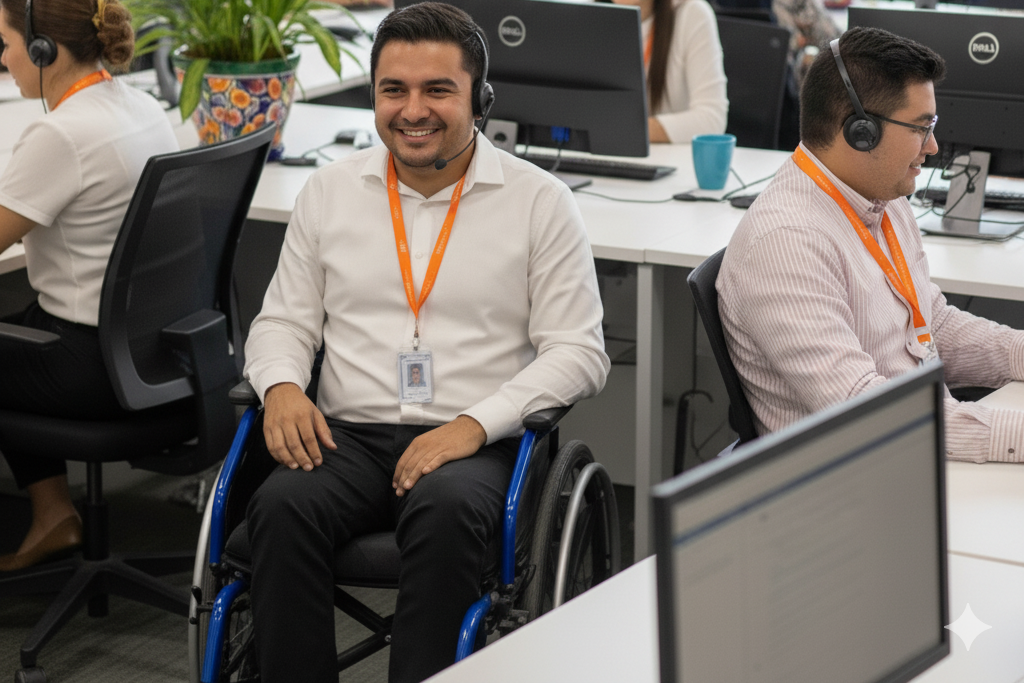
Greater labor inclusion for a fairer future
Labor inclusion has evolved from an ethical aspiration to a desirable and, in many cases, mandatory practice in countries around the world. Through international conventions such as the Universal Declaration of Human Rights (1948) and, more recently, the UN Convention on the Rights of Persons with Disabilities (2006), a global agenda promoting employment equity has emerged.
In Mexico, labor inclusion began to take shape as a public policy with the enactment of the General Law for the Inclusion of Persons with Disabilities in 2011, reinforced by various official regulations such as NOM-034-STPS.
While workplace inclusion has become a strategic priority for organizations seeking to comply with the law while also building more fair, representative, and efficient work environments, for companies like CallFasst, this commitment goes beyond rhetoric: it is part of their internal culture and hiring policies.
According to the World Health Organization , 16% of the global population lives with a significant disability, or more than 1.3 billion people. In Mexico, this figure rises to more than 6 million people, according to INEGI . This not only poses a challenge for social inclusion, but also an opportunity for economic development, innovation, and the strengthening of diverse teams.
What does it mean to be an inclusive company?
This guarantees equal opportunities for all people, regardless of their physical, sensory, cognitive, or social condition. It’s not just about hiring people with disabilities, but also about creating accessible, empathetic, and tailored work environments.
This implies:
- Recruitment with an inclusive perspective.
- Reasonable adjustments to the physical and digital environment.
- Organizational culture based on respect and empathy.
- Ongoing training to eliminate biases and foster collaboration.
Tangible benefits of promoting labor inclusion
1. Access to valuable and committed talent: Studies such as the one conducted by Accenture in its report Getting to Equal: The Disability Inclusion Advantage (2018) show that companies that actively promote the inclusion of people with disabilities have 28% more revenue and twice the net income of their peers. Similarly, a report by The Valuable 500 highlights that organizations with inclusive policies report greater talent retention and internal satisfaction. These findings demonstrate that including people with disabilities is not only an ethical issue, but also a smart business decision.
2. Improved work environment and organizational culture: Diversity promotes empathy, creativity, and collaboration. Diverse teams are also more resilient and better able to adapt to change.
3. Regulatory compliance and access to public tenders: In Mexico, the General Law for the Inclusion of Persons with Disabilities and the NOM-034-STPS establish clear obligations to promote equity in the workplace. Inclusive companies also have more opportunities to obtain certifications such as ESR or participate in government processes.
4. Improved corporate reputation: Consumers value brands that act with social responsibility. As Purple Tuesday points out , when companies include people with disabilities on their teams, they are better equipped to understand the real barriers customers and users face, improving empathy, customer experience, and problem-solving. In fact, according to a report cited by Entrepreneur , 70% of people with disabilities and their families have abandoned brands due to poor inclusion experiences. This applies to both customers and employees.
5. Innovation in processes and solutions: Including people with diverse profiles and worldviews drives innovation. Inclusive solutions are often more efficient and creative because they integrate different worldviews and real-life experiences that pose additional challenges to others.
Good practices to promote labor inclusion
1. Inclusive hiring policies: Publish vacancies without bias, collaborate with institutions that promote the employment of people with disabilities, and establish filters that promote equity in the selection process.
2. Reasonable adjustments to the work environment: From ergonomic furniture to accessible software or flexible shifts. The important thing is to adapt the environment to individual needs, without compromising productivity or quality.
3. Ongoing team training: Train middle and senior management in diversity and inclusion, as well as raise awareness among all employees about the importance of respecting and valuing differences.
4. Listen to improve: Establish feedback channels that allow people with disabilities to express their needs, suggestions, or concerns. Their experience is key to improving inclusion processes.
5. Make diversity visible and celebrate it: Share best practices, celebrate key dates (such as the International Day of Persons with Disabilities), and publicly recognize those who promote inclusion in their roles within the company.
CallFasst’s commitment to inclusion
At CallFasst, workplace inclusion isn’t a compliance requirement: it’s a conscious decision that’s part of its identity. As part of its hiring policies, the company has integrated people with disabilities into its care and support teams. This has enriched its organizational culture, strengthened its staff’s empathy, and generated more responsive and efficient processes.
By incorporating diverse talent, CallFasst has not only contributed to the professional development of its employees, but has also improved its ability to understand and serve different types of clients. Because there are no better advisors than those who understand the barriers their clients have faced.
This approach also aligns CallFasst with best practices in the global BPO industry, where more and more companies are recognizing that workforce inclusion is a key factor for sustainability, reputation, and long-term success.
To include is to transform
Being an inclusive company is both an ethical duty and a strategic opportunity. Today’s society lives under a philosophy and reality in which diversity is not an exception, but the norm. And organizations that understand this and act accordingly are the ones that will lead the future of work.
CallFasst has proven that it is possible to build a diverse, empathetic, and professional work environment. And although the path toward full inclusion is still underway, taking firm steps in that direction makes all the difference. Inclusion isn’t just about hiring: it’s about transforming the way we work, interact, and grow together.
